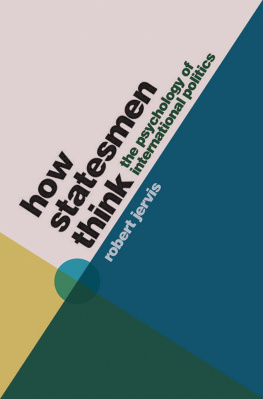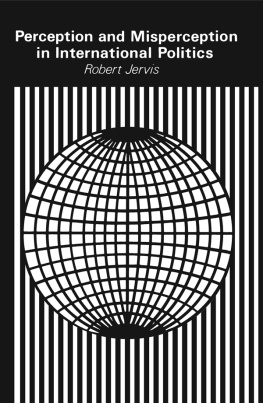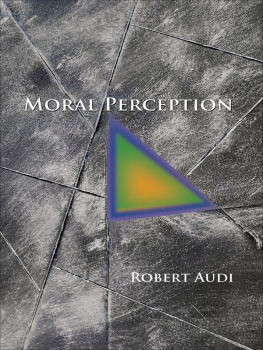
Perception and Misperception in International Politics
Written under the auspices of the Center for International Affairs, Harvard University
Robert Jervis
Perception and Misperception in International Politics
With a new preface by the author
PRINCETON UNIVERSITY PRESS
Princeton, New Jersey
Copyright 1976 by Princeton University Press
Published by Princeton University Press, Princeton, New Jersey
In the United Kingdom: Princeton University Press,
6 Oxford Street, Woodstock, Oxfordshire OX20 1TR
New paperback edition, 2017
Paperback ISBN: 978-0-691-17585-0
L ibrary of C ongress C ontrol N umber: 2016959620
This book has been composed in Linotype Times Roman
Princeton University Press books are printed on acid-free paper and meet the guidelines for permanence and durability of the Committee on Production Guidelines for Book Longevity of the Council on Library Resources
press.princeton.edu
Printed in the United States of America
10 9 8 7 6 5 4 3 2 1
To Kathe
PREFACE TO THE SECOND EDITION
T he route by which I came to write Perception and Misperception was not straightforward. I did not start out to become a political psychologist, but rather approached the field as a critic of one aspect of it for reasons that go back much earlier. From my childhood, I was interested in international politics, or at least the international politics of the period, which was the Cold War. The central question was how to avoid the twin dangers of nuclear war and Soviet encroachment on American security and values. which I found to be enormously exciting and intellectually stimulating. They gave me many of the tools that I have used throughout my career.
Although these works do not figure heavily in Perception and Misperception, they bolstered my interest in the theory and practice of deterrence. As a budding proponent, as theorists they were justified in making founding assumptions, including those about the nature of the actors and their intentions. But at minimum deterrence proponents should have clearly stated that this was their assumption. For policymakers, of course, the question was even more important since they had to (or should have had to) think about the possibility that their policies were deepening if not creating dangers to the country and the world.
W HY S TUDY P ERCEPTION?
It also became clear to me that the debate between the proponents and critics of deterrence theory had been incorrectly framed. The former did not deny that threats could backfire if they were levied against states whose primary motivation was to gain security, and the latter agreed that threats and force were
Instead I took off from the fact that most international relations (IR) scholars had ignored the general question of how states perceived each other and, despite a concentration on issues of national security, had paid little attention to the more specific topic of when and why threats are perceived. This was quite striking because at this time (in the 1950s and 1960s) the consensus among historians was that misperceptions were a central cause of both world wars. British leaders had exaggerated the threat from Wilhelmine Germany and failed to see the extent to which their own behavior in aligning with France and Russia had contributed to German insecurity, and the counterproductive appeasement policies of the 1930s were based on the faulty belief that Hitler could be conciliated, a view that was partly rooted in the British reading of World War I as an unnecessary conflict.
Planning to approach that subject indirectly, I decided to focus on the more general analysis of perception and misperception.
It is telling that debates about the adversarys intentions are rarely resolved absent extraordinary actions like Hitlers takeover of the rump of Czechoslovakia in March of 1939. Indeed, until 1990 a significant number of presidential advisers and foreign policy experts felt that Mikhail Gorbachevs myriad concessions were only a ploy to lull the West, and we still argue about the nature of Wilhelmine foreign policy from over a century ago.
States not only have to strive to accurately perceive their environments, they must also take account of others perceptions. To extend the argument in the previous paragraph, states need to understand whether others see them as menacing or reassuring, weak or strong (in both capabilities and resolve), as consistent and steadfast or as changeable. The way the other responds to what the state does will depend at least in part on how it sees the state, and the state has to understand this if it is to develop an effective policy. This exercise in empathy is hard, especially when the others beliefs are widely discrepant from how the state sees the situation. To take a current example, American officials know that the United States had nothing to do with the failed Turkish coup in July 2016, but in some sense this is irrelevant. The Turkish government and most of the public live in a very different world, one in which the United States was deeply involved in these events, and the United States needs to understand this if it is to fathom Turkeys policy toward it (and other countries as well) and predict what Turkey is likely to do in the future. Any effective American policy must take the Turkish perceptions as a starting point. Of course, the United States may seek to change them, something that requires an understanding of the Turkish view, and if change is impossible policy will have to be based on this unfortunate reality.
Scholars as well as contemporary policymakers have to understand the actors perceptions. The explanation for the German behavior before World War I is strongly influenced by whether the scholar believes that Germany felt secure and optimistic or whether its leaders believed that it was menaced and in decline. Even the questions asked can change as our understanding of the states perceptions do. Until the leak of the Pentagon Papers in 1971 most scholars thought that Lyndon Johnson had deployed ground troops in the spring of 1965 in the belief that the United States could prevail quickly and easily. The problem for scholarship and contemporary commentary was to explain how American intelligence and decision-makers could have been so overoptimistic and how the process of escalation gained momentum and made withdrawal more difficult as it went on (the Quagmire Theory). The Pentagon Papers showed that Johnson and his colleagues were much more clear-eyed than this and that they expected the war to be costly and of uncertain outcome. What then needed to be explained was why they thought it was so important to prevail in Vietnam. If the United States had thought victory would be easy, any number of goals or impulses, even secondary or weak ones, could have produced the decision to intervene, and tracking them down would not tell us much about American foreign policy; once it was understood, however, that decision-makers saw the prospects more accurately, the dominant puzzle became what drove them to proceed in the face of the high costs that were expected.
Of course, although foreign policy has to pass through the minds of leaders, perceiving and thinking may not be all there is to it, and the first chapter of Perception and Misperception is devoted to discussing the level-of-analysis questionin other words, the question of whether the main determinants of a states policy lie in the realm of decision-making, bureaucratic politics, domestic politics, or the structure of the international system and the behavior of others within it. More recently I have discussed how and when leaders matter and how we can tell,24 Whether we are looking at fundamental characteristics like this or at more narrow ones that can characterize countries sharing the same culture, certain ways of looking at the world and perceiving other actors may be dominant in a country, and without resorting to essentialism it is easy to see how this can be maintained over time through institutionalization, socialization, and common historical memories.
Next page











